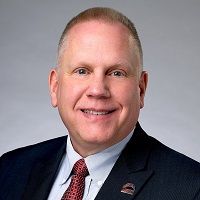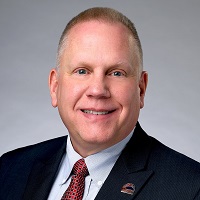I'm the CEO of a Credit Union: This Is What We Do to Earn Our Members' Trust
Cyberattacks, fraud, misinformation and confusing fees weaken confidence in financial institutions when what people want most is a financial partner that listens, responds and acts with their best interests at heart.


Profit and prosper with the best of Kiplinger's advice on investing, taxes, retirement, personal finance and much more. Delivered daily. Enter your email in the box and click Sign Me Up.
You are now subscribed
Your newsletter sign-up was successful
Want to add more newsletters?

Delivered daily
Kiplinger Today
Profit and prosper with the best of Kiplinger's advice on investing, taxes, retirement, personal finance and much more delivered daily. Smart money moves start here.

Sent five days a week
Kiplinger A Step Ahead
Get practical help to make better financial decisions in your everyday life, from spending to savings on top deals.

Delivered daily
Kiplinger Closing Bell
Get today's biggest financial and investing headlines delivered to your inbox every day the U.S. stock market is open.

Sent twice a week
Kiplinger Adviser Intel
Financial pros across the country share best practices and fresh tactics to preserve and grow your wealth.

Delivered weekly
Kiplinger Tax Tips
Trim your federal and state tax bills with practical tax-planning and tax-cutting strategies.

Sent twice a week
Kiplinger Retirement Tips
Your twice-a-week guide to planning and enjoying a financially secure and richly rewarding retirement

Sent bimonthly.
Kiplinger Adviser Angle
Insights for advisers, wealth managers and other financial professionals.

Sent twice a week
Kiplinger Investing Weekly
Your twice-a-week roundup of promising stocks, funds, companies and industries you should consider, ones you should avoid, and why.

Sent weekly for six weeks
Kiplinger Invest for Retirement
Your step-by-step six-part series on how to invest for retirement, from devising a successful strategy to exactly which investments to choose.
Banks and credit unions have made a lot of effort through the years to restore the trust of Americans who rely on them to hold their hard-earned money.
Since the turn of the century, consumers have had plenty of reasons to be selective and critical of institutions due to cyberattacks, personal identification hacks, mismanagement of accounts and the mortgage crisis of the late 2000s.
Trust in a financial institution is built over time, yet it can be lost in an instant. When that trust is fragile, as it's been for some time, the role of a credit union becomes even clearer.
From just $107.88 $24.99 for Kiplinger Personal Finance
Become a smarter, better informed investor. Subscribe from just $107.88 $24.99, plus get up to 4 Special Issues

Sign up for Kiplinger’s Free Newsletters
Profit and prosper with the best of expert advice on investing, taxes, retirement, personal finance and more - straight to your e-mail.
Profit and prosper with the best of expert advice - straight to your e-mail.
Kiplinger's Adviser Intel, formerly known as Building Wealth, is a curated network of trusted financial professionals who share expert insights on wealth building and preservation. Contributors, including fiduciary financial planners, wealth managers, CEOs and attorneys, provide actionable advice about retirement planning, estate planning, tax strategies and more. Experts are invited to contribute and do not pay to be included, so you can trust their advice is honest and valuable.
People want to know that the organization holding their money sees a customer as more than an account number. Individuals, couples and families want a financial partner that listens, responds, and acts with their best interests at heart.
Trust is built through daily actions
For me, trust is built in those everyday moments when a member's well-being comes first. It's the time to listen to someone who's uncertain about their finances, the clarity a financial institution can provide when options feel overwhelming, and the follow-through that shows words matter.
Each action sends a signal that there's an investment in people's security and peace of mind.
That commitment is woven into how we operate at Affinity Federal Credit Union, where I am the CEO and president.
Reliability, transparency, and empathy shape every interaction. If we make a mistake, we own it. If a concern goes unresolved, we revisit it until it's right.
That consistency forms the base layer of trust because members notice not just what we do well, but how we respond when things don't go as planned.
One moment that stands out involved a member facing unexpected medical bills and struggling to keep up with loan payments.
Rather than send a form letter, our team reached out to the person directly, reviewed the situation, and adjusted the repayment schedule so it fit the member's reality.
There was nothing complex about it on our side. It was just a simple act of understanding. That approach reinforced what trust really means: being there when people need you most.
Different generations often define trust in slightly different ways:
- Younger members tend to associate it with convenience and digital reliability. They want seamless, secure access paired with responsiveness when they reach out.
- Older members often value face-to-face relationships and personal familiarity.
The common thread is dependability. Whether someone taps a mobile app or walks into a branch, they want to feel the same level of care and accountability.
Balancing technology and human connection
It's important to focus on aligning technology and the people a financial institution serves. Strong digital tools make banking easier, but they can't replace empathy or judgment.
When personal connection is supported by trustworthy systems, members feel confident that their financial partner is looking out for them.
Looking for expert tips to grow and preserve your wealth? Sign up for Adviser Intel (formerly known as Building Wealth), our free, twice-weekly newsletter.
Trust can erode quickly in today's environment. Cyberattacks, fraud, misinformation, and confusing fees all have the potential to weaken confidence. My team at Affinity takes those risks seriously.
Our employees receive ongoing training to stay ahead of new scams, and our response teams act immediately when a threat arises. Every communication is clear, prompt, and honest.
That transparency, especially in stressful moments, strengthens trust.
Recent data reinforces that there's still work to do. A 2025 Accenture study found that while most consumers trust their main bank to keep their data secure, barely half extend that same trust to other financial providers. That gap shows why steady communication and visible action matter.
People want to see that their institution is as invested in their safety as they are in their savings.
Trust through shared ownership
What makes credit union trust distinct is that it's built on shared ownership. Members aren't customers. They're part of the cooperative itself.
Every decision these institutions make is shaped by accountability to those they serve, not to outside shareholders. That creates a deeper sense of purpose behind every interaction.
When people know an institution exists to serve rather than to sell, trust comes more naturally.
People want to feel that their financial partner is steady, transparent, and genuinely on their side. Credit unions were built to uphold that mission.
Related Content
- Why More People Are Using Small Banks and Credit Unions
- Beyond Banking: How Credit Unions Serve Their Communities
- How Financial Institutions Can Blend Tech With Human Connection
- How to Fight Inflation's Hidden Threat to Your Savings
- Four Reasons Credit Unions Are a Good Bet in Unsettled Times
Profit and prosper with the best of Kiplinger's advice on investing, taxes, retirement, personal finance and much more. Delivered daily. Enter your email in the box and click Sign Me Up.

Kevin Brauer, a distinguished finance industry professional with over three decades of experience, has been at the helm of Affinity Credit Union as CEO and President since January 2023. His substantial contribution to Affinity over the past seven years has been instrumental in propelling the firm's value proposition and innovating its financial well-being initiatives. Brauer leads Affinity's dedicated team of 500 employees at its Basking Ridge, N.J., headquarters and throughout its 18-plus branches.
-
 Nasdaq Leads a Rocky Risk-On Rally: Stock Market Today
Nasdaq Leads a Rocky Risk-On Rally: Stock Market TodayAnother worrying bout of late-session weakness couldn't take down the main equity indexes on Wednesday.
-
 Quiz: Do You Know How to Avoid the "Medigap Trap?"
Quiz: Do You Know How to Avoid the "Medigap Trap?"Quiz Test your basic knowledge of the "Medigap Trap" in our quick quiz.
-
 5 Top Tax-Efficient Mutual Funds for Smarter Investing
5 Top Tax-Efficient Mutual Funds for Smarter InvestingMutual funds are many things, but "tax-friendly" usually isn't one of them. These are the exceptions.
-
 Nasdaq Leads a Rocky Risk-On Rally: Stock Market Today
Nasdaq Leads a Rocky Risk-On Rally: Stock Market TodayAnother worrying bout of late-session weakness couldn't take down the main equity indexes on Wednesday.
-
 5 Top Tax-Efficient Mutual Funds for Smarter Investing
5 Top Tax-Efficient Mutual Funds for Smarter InvestingMutual funds are many things, but "tax-friendly" usually isn't one of them. These are the exceptions.
-
 Why Invest In Mutual Funds When ETFs Exist?
Why Invest In Mutual Funds When ETFs Exist?Exchange-traded funds are cheaper, more tax-efficient and more flexible. But don't put mutual funds out to pasture quite yet.
-
 Social Security Break-Even Math Is Helpful, But Don't Let It Dictate When You'll File
Social Security Break-Even Math Is Helpful, But Don't Let It Dictate When You'll FileYour Social Security break-even age tells you how long you'd need to live for delaying to pay off, but shouldn't be the sole basis for deciding when to claim.
-
 I'm an Opportunity Zone Pro: This Is How to Deliver Roth-Like Tax-Free Growth (Without Contribution Limits)
I'm an Opportunity Zone Pro: This Is How to Deliver Roth-Like Tax-Free Growth (Without Contribution Limits)Investors who combine Roth IRAs, the gold standard of tax-free savings, with qualified opportunity funds could enjoy decades of tax-free growth.
-
 One of the Most Powerful Wealth-Building Moves a Woman Can Make: A Midcareer Pivot
One of the Most Powerful Wealth-Building Moves a Woman Can Make: A Midcareer PivotIf it feels like you can't sustain what you're doing for the next 20 years, it's time for an honest look at what's draining you and what energizes you.
-
 Stocks Make More Big Up and Down Moves: Stock Market Today
Stocks Make More Big Up and Down Moves: Stock Market TodayThe impact of revolutionary technology has replaced world-changing trade policy as the major variable for markets, with mixed results for sectors and stocks.
-
 I'm a Wealth Adviser Obsessed With Mahjong: Here Are 8 Ways It Can Teach Us How to Manage Our Money
I'm a Wealth Adviser Obsessed With Mahjong: Here Are 8 Ways It Can Teach Us How to Manage Our MoneyThis increasingly popular Chinese game can teach us not only how to help manage our money but also how important it is to connect with other people.